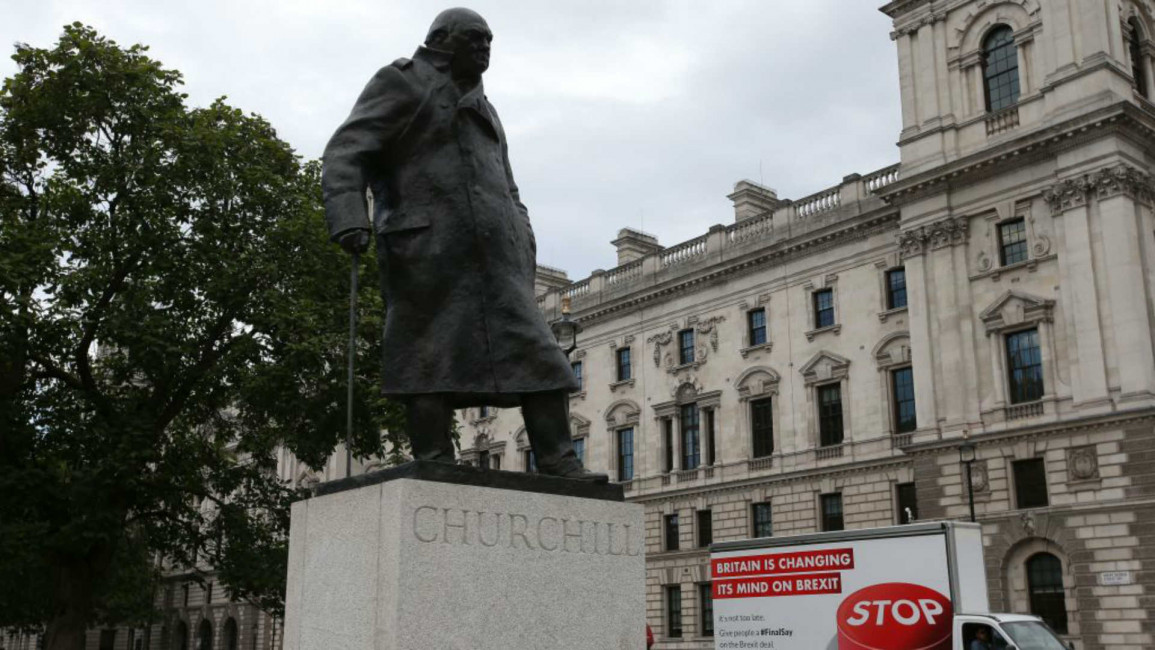
Was Winston Churchill a racist?
Andrews dared to question the wartime leader's revered status and described him as a racist who believed in White supremacy.
This incensed Morgan who insisted that Churchill should be celebrated for his leadership during World War II. The interview then rapidly descended into a heated stand off, as Morgan accused Andrews of hating Britain and questioned why he remained in the country if he didn't like it.
The back and forth was reminiscent of a similar encounter between Morgan and the journalist Afua Hirsch, when she was asked if British people should be ashamed of Churchill.
Piers Morgan is no stranger to controversy. He lost his job as Editor of the tabloid newspaper The Daily Mirror, after it published faked photos of British soldiers abusing Iraqi prisoners in 2004. He was also criticised by the Leveson public inquiry into the culture, practices and ethics of the British press and is often ridiculed for his attention seeking tactics and habit of getting into Twitter spats with celebrities.
This week's Churchill debate showcased Morgan's flair for provocation, and his penchant for entrenched dominant narratives around British historical figures and "White Fragility", when broaching sensitive questions on race and empire in the mainstream media.
 |
When people of colour express grievances about Britain's legacy, they are labelled as unpatriotic |  |
It is unlikely that Morgan would have invited a White British interviewee who was critical of Britain's imperial past, to "leave the country if you don't like it". For Morgan and his ilk, such issues are considered to be in the past, and when people of colour express grievances about Britain's legacy, they are labelled as unpatriotic. The social media messages Andrews received after the show vindicated much of his argument.
Voted the greatest Briton of all times, the life of Winston Churchill is of course more complex that the likes of Morgan is willing to admit. In the West, Churchill is often painted as the man who single handedly saved western liberal democracy from Nazism, as illustrated in the recent Hollywood movie.
Twitter Post
|
However, his views on race are less well known. As a young MP, he cheered on Britain's plan for more territorial conquests, insisting that its "Aryan stock is bound to triumph."
Serving as the British Colonial Secretary, he "created Jordan with a stroke of a pen", and in the late 1930s referred to Palestinians as "barbaric hordes who ate little but camel dung."
When the Iraqis rebelled against British rule, Churchill said "I am strongly in favour of using poison gas against uncivilised tribes." He is also on record as having said "I hate Indians", partly explaining his actions as prime minister during the Bengal famine of 1943 that resulted in the deaths of between 1.5 million and 4 million people.
When assessing the life of Churchill, his personal views which translated into imperial policies cannot be ignored.
It is simply not good enough to hide behind the "he was a man of his times" line of reasoning, when the same could be said of Hitler - a point made by Andrews to Morgan in the interview. All historical figures were shaped by the times in which they lived, but that should not prevent an honest examination of the totality their lives.
Today, Britain's multiculturalism is a direct result of British colonialism and the invitation to people from the former colonies to help rebuild the nation after the Second World War.
But the UK has yet to come to terms with the far-reaching legacies of empire, and its Black and ethnic minorities are still struggling to achieve real social equality. Worse still, the advances of the 1980s and 1990s are now being rolled back, as openly racist sentiment increases in wake of the Brexit vote of 2016, racial and religious intolerance is on the rise, and increasingly people think the "British Empire was a good thing."
 |
When assessing the life of Churchill, his personal views which translated into imperial policies cannot be ignored |  |
Whether one considers Winston Churchill to be a racist or is a matter of perspective.
The tone of this Morgan-Andrews exchange is a telling reflection of the thorny state of race-relations in Britain today, and society's overwhelming reluctance to critically evaluate the impact of colonialism.
Morgan's school of thought expects ethnic minorities - who despite being citizens and having contributed to the UK for generations - to be "grateful for being allowed to live here."
This thinking conveniently sidesteps the difficult conversations we should be having about racial and religious discrimination, rising levels of anti-Semitism, racism, xenophobia and Islamophobia.
Shouting down dissenting voices will not answer unresolved questions of empire, or deal with the pain caused by the structural legacy of racist violence in today's Britain.
Dr Sadek Hamid is an academic who has written widely about British Muslims. He is the author of 'Sufis, Salafis and Islamists: The Contested Ground of British Islamic Activism' and is co-author of 'British Muslims: New Directions in Islamic Thought, Creativity and Activism'.
Follow him on Twitter: @sadekhamid
Opinions expressed in this article remain those of the author, and do not necessarily represent those of The New Arab, its editorial board or staff.




